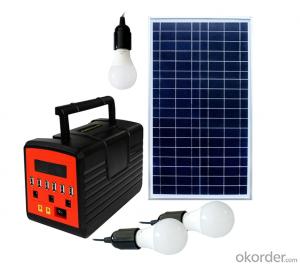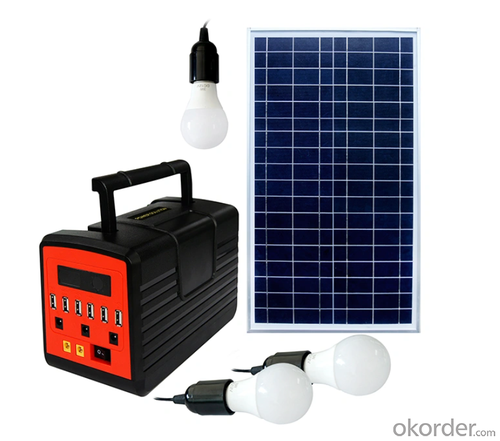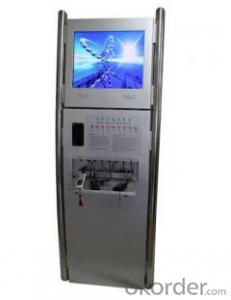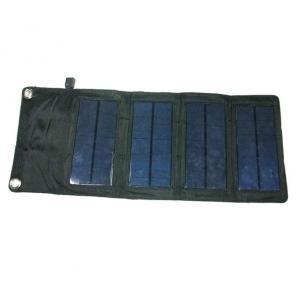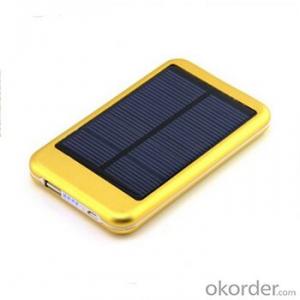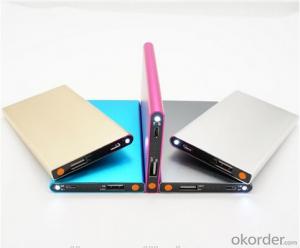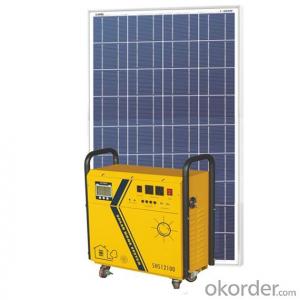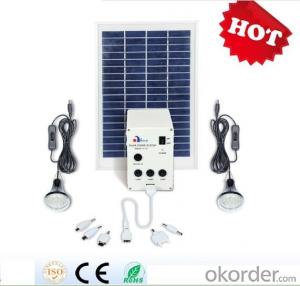Emergency Solar Energy Systems:Solar Kits for 3-Room Home Power with 6 USB Mobile Phone Chargers
- Loading Port:
- Shekou
- Payment Terms:
- TT OR LC
- Min Order Qty:
- 1 set
- Supply Capability:
- 500 set/month
OKorder Service Pledge
OKorder Financial Service
You Might Also Like
Specification
1. Description of Solar Kits solar home power system for 3rooms with 6 USB Mobile Phone Charger
1) Provide Lighting And Phone Charger Solution For Family2) Light Up 3room At The Same Time
3) Charge Different Mobile Phone
3) For Indoor and Outdoor Use
4) Very Easy To Set Up And Use
5) Just Pay For Onece, Then You Need Is All Free Sunlight
2. Specifications of Solar Kits solar home power system for 3rooms with 6 USB Mobile Phone Charger
| Solar panel | 1x20w 16v |
| Battery | 11.1V/13000mAh |
| Light source | 3x3w LED bulbs |
| Working time | 14-43 hours |
| Charging time | 6-8 hrs |
| Accessory | 5-in-1 USB mobile adapter |
3. Features of Solar Kits solar home power system for 3rooms with 6 USB Mobile Phone Charger
- Solar Lamp, All in 1 solar DIY DC new LED light
- LED lamp, light up 3 rooms at the same time
- LED lighting and USB port mobile charging in one device
- Over-charging/discharging protection on battery
- Easy operation, just need plug and play
- Easy replaceable Li-ion battery for recycling use
4. Pictures of usages


5. Pakages of transport

- Q: Can solar energy systems be installed on schools or educational institutions?
- Yes, solar energy systems can be installed on schools or educational institutions. In fact, many schools and educational institutions are increasingly adopting solar energy systems as a sustainable and cost-effective solution to meet their energy needs. These systems not only reduce electricity costs but also provide educational opportunities for students to learn about renewable energy and environmental conservation.
- Q: Can solar energy systems be used in commercial agriculture?
- Yes, solar energy systems can be used in commercial agriculture. They can provide a sustainable and cost-effective solution for powering various agricultural operations such as irrigation systems, greenhouse heating, and livestock facilities. Solar panels can be installed on rooftops or as ground-mounted systems in farms to harness the sun's energy and generate electricity for on-site use. This helps reduce reliance on traditional energy sources, lowers operational costs, and promotes environmentally friendly practices in commercial agriculture.
- Q: Can solar energy systems be installed on the ground?
- Yes, solar energy systems can be installed on the ground. In fact, ground-mounted solar systems are a popular choice for both residential and commercial applications. These systems typically consist of solar panels mounted on a structure or framework that is anchored to the ground. Ground-mounted systems offer several advantages over rooftop installations, such as increased flexibility in system design, easier access for maintenance and cleaning, and the ability to optimize the orientation and tilt angle of the panels for maximum energy production. Additionally, ground-mounted systems can be installed in areas with limited roof space or where the roof is not suitable for solar panel installation. Overall, ground-mounted solar energy systems provide a practical and efficient way to harness the power of the sun for electricity generation.
- Q: Can solar energy systems be used for powering off-grid eco-farms?
- Yes, solar energy systems can definitely be used for powering off-grid eco-farms. Solar panels can be installed to harness sunlight and convert it into electricity, which can then be used to power various farm operations such as irrigation systems, lighting, ventilation, and machinery. This renewable energy source is ideal for off-grid eco-farms as it reduces dependence on fossil fuels, minimizes environmental impact, and offers a sustainable solution for meeting energy needs in remote farming locations.
- Q: Can solar energy systems be used for powering recycling facilities?
- Indeed, recycling facilities can certainly utilize solar energy systems for their power needs. Solar energy, a renewable and eco-friendly power source, can be harvested through the use of photovoltaic (PV) panels or solar thermal systems. These systems have the ability to convert sunlight into electricity or heat, which can then be employed to fuel a variety of operations within a recycling facility. The machinery and equipment necessary for recycling processes, such as conveyors, sorting machines, crushers, and compactors, can be powered by the electricity produced by solar panels. Additionally, solar energy can also be utilized to sustain lighting systems, ventilation, and heating/cooling systems, guaranteeing an efficient and sustainable functioning of the facility. Opting for solar energy to power recycling facilities brings forth numerous advantages. Firstly, it diminishes reliance on conventional fossil fuel-based electricity, consequently decreasing carbon emissions and mitigating environmental impact. Secondly, solar energy systems provide a steady and predictable source of power, thereby reducing vulnerability to power outages or price fluctuations. Furthermore, utilizing solar power can result in energy cost savings for recycling facilities in the long term, as the initial investment in solar panels can be compensated by reduced electricity bills over time. To conclude, solar energy systems are a feasible and environmentally-conscious choice for powering recycling facilities. By harnessing the energy of the sun, these facilities can function sustainably, reduce their carbon footprint, and contribute to a cleaner and more sustainable future.
- Q: Can a solar energy system be installed in an area with a high earthquake risk?
- Yes, a solar energy system can be installed in an area with a high earthquake risk. However, specific design considerations and engineering expertise are required to ensure the system can withstand seismic activity. Implementing advanced mounting systems, utilizing flexible wiring, and reinforcing structural supports are some of the measures taken to enhance the system's resilience against earthquakes.
- Q: Can solar energy systems be used for powering electric vehicle public transportation systems?
- Yes, solar energy systems can be used to power electric vehicle public transportation systems. Solar panels can be installed on the roofs of charging stations or directly on the vehicles themselves to generate electricity from sunlight. This renewable energy can then be used to charge the electric vehicles, reducing the reliance on non-renewable energy sources and decreasing the carbon footprint of public transportation systems.
- Q: Are there any risks of electrical shock with solar energy systems?
- Solar energy systems carry potential risks of electrical shock. While generally considered safe, these systems can be hazardous due to the presence of high voltages and electrical currents. Failure to handle or manage them properly can result in accidents. Several key risks are associated with solar energy systems: 1. Installation and maintenance: Improper procedures during the installation and maintenance of solar panels can lead to contact with live electrical components. This can happen when safety protocols are not followed or when untrained individuals attempt to handle electrical connections. 2. Equipment or wiring malfunctions: Defective inverters, wiring, or other equipment can increase the risk of electrical shock. Poor installation practices or insufficient maintenance can also result in electrical faults, exposing individuals to dangerous currents. 3. Fire hazards: While not directly related to electrical shock, faulty electrical components or wiring can raise the risk of fires in solar energy systems. Attempting to extinguish such fires without shutting down the electrical system first can further worsen the risk of electrical shock. To minimize these risks, it is essential to adhere to proper installation and maintenance procedures. This often involves seeking assistance from licensed professionals. Furthermore, individuals working with solar energy systems should be trained in safety protocols, including the use of appropriate personal protective equipment and ensuring proper grounding of electrical systems. Regular inspections and maintenance are also crucial to detect and address any potential electrical hazards.
- Q: Can a solar energy system be used off-grid?
- Certainly! A solar energy system has the capability to function without being connected to the main power grid. Stand-alone systems, also referred to as off-grid systems, are specifically designed to generate and store electricity in regions that do not have access to the conventional power grid. These systems typically comprise of solar panels, a battery bank, and an inverter. Throughout the day, the solar panels convert sunlight into electricity, which can then be utilized to power various appliances, lights, and other electrical devices. Any surplus energy is stored in the battery bank for usage during periods without sunlight or during the night. Off-grid solar energy systems are extremely beneficial in remote areas or places where access to the power grid is unreliable or non-existent, as they provide a sustainable and self-sufficient source of electricity.
- Q: Can solar energy systems be used for transportation?
- Yes, solar energy systems can be used for transportation. Solar-powered vehicles, such as solar cars, solar boats, and solar planes, have been developed and successfully used for transportation purposes. These vehicles harness the energy from the sun through solar panels, converting it into electricity to power their propulsion systems. While solar energy may have limitations in terms of efficiency and range, advancements in technology are continuously improving the viability of solar-powered transportation.
Send your message to us
Emergency Solar Energy Systems:Solar Kits for 3-Room Home Power with 6 USB Mobile Phone Chargers
- Loading Port:
- Shekou
- Payment Terms:
- TT OR LC
- Min Order Qty:
- 1 set
- Supply Capability:
- 500 set/month
OKorder Service Pledge
OKorder Financial Service
Similar products
Hot products
Hot Searches
Related keywords
